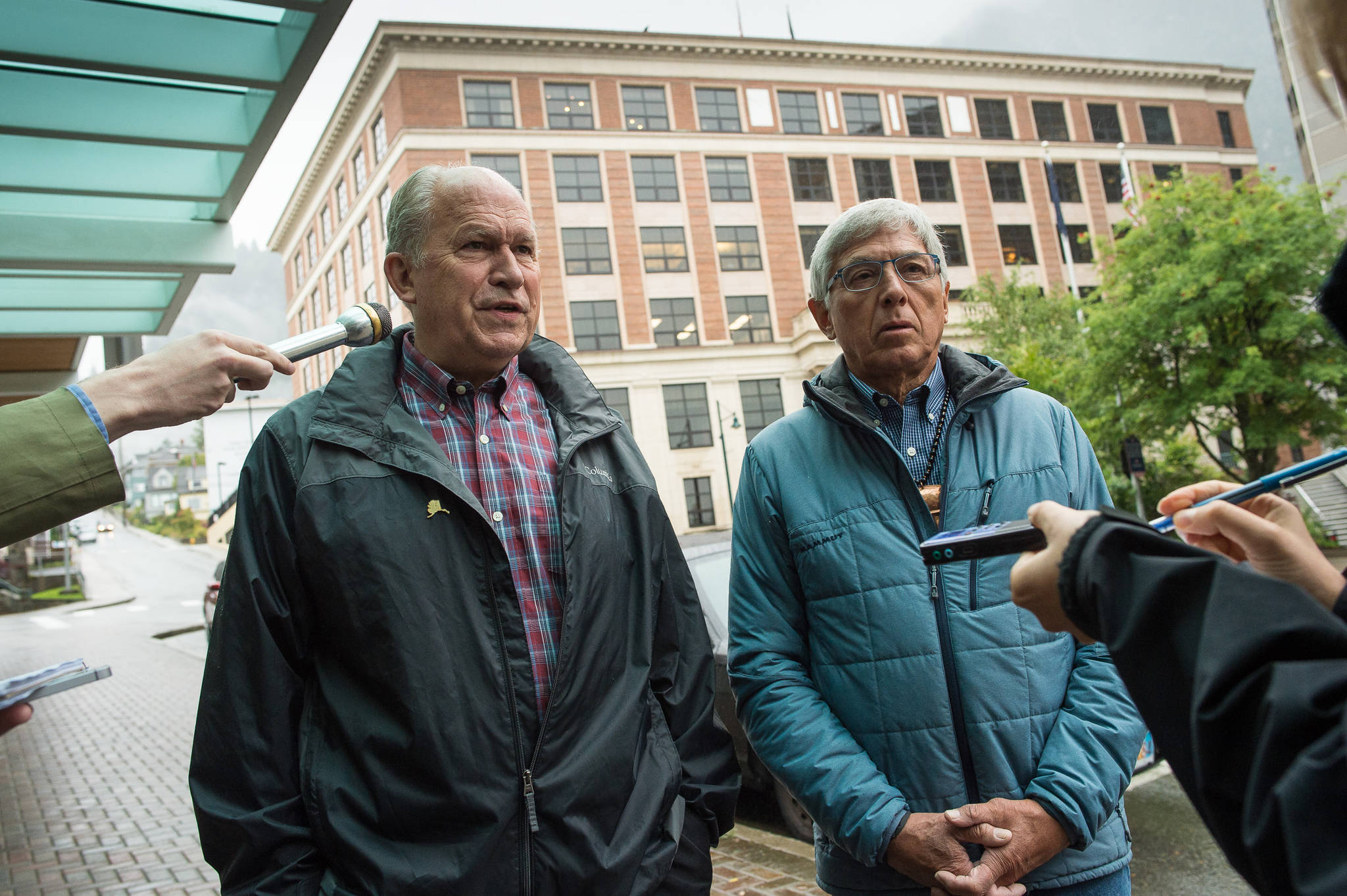Gov. Bill Walker and Lt. Gov. Byron Mallott will attempt to repeat the “unity ticket” in a second term.
On Monday morning, both men filed documents at the headquarters of the Alaska Division of Elections indicating their intent to run for re-election in 2018. They intend to skip the statewide primary and run as independents in the Nov. 6, 2018 general election.
“Our administration has been an independent one and will continue to be one,” Mallott told reporters after turning in his paperwork.
“We just think Alaska does better with a nonpartisan administration,” Walker said. “As I’ve said before, no party has a monopoly on the best ideas.”
As a nonpartisan administration, Walker said the state can “draw upon any (of those ideas) without any hesitation.”
In 2014, Mallott and Walker defeated incumbent Gov. Sean Parnell by 2.3 percentage points after Mallott withdrew his name as the Democratic gubernatorial candidate in order to become Walker’s running mate. Earlier this month, Mallott foreshadowed Monday’s filing when he confirmed that the pair would run for re-election.
Competition to come
The field of gubernatorial competitors remains thin so far, but that’s likely to change.
“I think there will be a lively race,” Walker said. “Lots of competition.”
Republican state Sen. Mike Dunleavy, R-Wasilla, has formally applied to run for governor from that party, as has Michael Sheldon of Petersburg.
Sheldon ran as a write-in candidate against Sen. Bert Stedman, R-Sitka, in a 2016 race for Alaska Senate. He received less than 4 percent of the vote.
One Democrat, Jacob Kern of Anchorage, has filed a letter of intent with the Alaska Public Offices Commission but not with the Division of Elections. Kern has run three times for Anchorage mayor, each time earning less than 1 percent of the vote.
Walker said Monday that the timing of his filing — more than a year before the general election — was about “finding the appropriate time to step away and get this done and get back to work.”
He said it removes uncertainty about what he and his lieutenant governor might or might not do in the election.
Many candidates for statewide office announce their intentions in the year preceding election. Alaska law places limits on the amount of money an individual or group can donate to a particular candidate. Those limits are based on annual limits, so any candidate who registers in 2017 can receive donations to the limit in 2017 and 2018.
“I believe we’ll have a full slate: Independent, Republican, Democrat,” said House Minority Leader Charisse Millett, R-Anchorage. “I would anticipate maybe even more than one independent ticket.”
Rep. Les Gara, D-Anchorage and a member of the House’s coalition majority, said he’s “not thrilled with the rumors that I’ve heard of more candidates.”
“The more people from more parties who jump in, the more it favors the Republicans,” he said.
What polls say
Polling indicates a challenger could find support among voters.
In a poll conducted between June 26 and July 3, Ivan Moore’s Alaska Survey Research found 38 percent of Alaskans have a positive view of the governor and 37 percent have a negative view. Thirteen percent were neutral, and another 13 percent didn’t know who the governor was.
On Facebook, Moore called those “tough numbers for re-election, particularly when you’re likely to have credible opponents running on the Republican and Democrat tickets.”
Moore’s figures were partially confirmed in April when a Morning Consult poll found 53 percent of Alaskans disapproved of Walker and 43 percent approved, with a 6 percent margin of error. That was the fifth-highest disapproval rating among all 50 governors nationally.
According to polls, Alaskans’ view of Walker has dipped significantly since he vetoed a portion of the 2016 Permanent Fund Dividend after the Alaska Legislature failed to address the state’s deficit that year.
As late as June 2016, Alaska Survey Research polls gave Walker a 43 percent approval rating and only a 23 percent disapproval rating. By September 2016, the disapproval rating had climbed to 35 percent, above a 32 percent approval rating.
On fiscal issues
Walker and Mallott each said resolving the state’s multibillion-dollar deficit is still atop their priority list. Gara and Millett said Walker’s re-election bid shouldn’t affect how the Legislature views him in the coming session.
“I don’t care whether he runs or not,” Gara said, adding that the deficit will remain regardless.
“He’s a moderate Republican. I think he’s honest. I don’t agree with him on everything, but I do agree with him that we need to solve the budget crisis that’s going to send the state into a deep recession,” Gara said.
Millett said she doesn’t think Walker’s re-election try will have “a broad effect on the Legislature,” but she thinks it will be interesting to watch whether Walker changes course on budget-fixing ideas he has previously endorsed, such as an income tax.
“I think it’ll be interesting to see how Gov. Walker positions himself on a very unpopular income tax,” she said.
With more than a year to go before the election, she cautioned that it’s too early to guess who will win and what will happen.
“I just think Alaska politics is always unpredictable, and once you think you know what’s happening, something arises,” she said.
The primary election is Aug. 21, 2018, and the general election is Nov. 6, 2018.
• Contact reporter James Brooks at james.k.brooks@juneauempire.com or call 523-2258.

